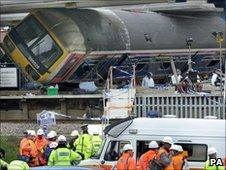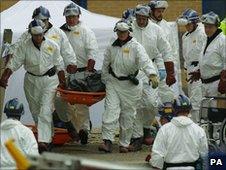Train 'lurched' day before Potters Bar rail cash
- Published

Passengers raised fears over "rough rides", the inquest heard
A company boss who felt a train "lurch" on the eve of the Potters Bar rail crash repeatedly tried to raise the alarm, an inquest has heard.
Peter Prime said he reported the movement near the crash scene to staff then twice rang the operating firm.
Great North Eastern Railway told him there was a tracking problem caused by a wheel imbalance, the court heard.
Seven people died on 10 May 2002 when a train hit faulty points south of Potters Bar station in Hertfordshire.
Mr Prime, who runs a limousine firm in Cambridgeshire, said he was on a 2030 BST train from London to Peterborough the day before the crash when he felt the movement 15 minutes into the journey.
'Very abnormal'
"I thought it was very abnormal - the first time I had ever experienced anything on a train that had seriously worried me," he told the inquest.
He said he reported it to a buffet car steward who told him the train manager would contact him before he got off - but no-one did.
He told jurors he twice rang GNER the next morning to raise the alarm and when he spoke to a member of staff was told the train had a tracking problem which was being dealt with.

More than 70 people were injured in the fatal rail crash in May 2002
Cups and saucers had slid across tables, worrying other passengers, he told the inquest in Letchworth, Herts.
Mr Prime was not the only person to report a potential problem, the court heard.
A station announcer also raised concerns over a set of points 16 hours before the crash, the resumed inquest was told.
Terence Moore said he raised the alarm at Stevenage station after feeling "violent" jolts travelling south of the crash site at about 2100 BST on 9 May 2002.
'Slipped his mind'
Mr Moore, who worked at Finsbury Park station in north London, said he feared a "lethal" accident.
He told the court: "It was a rougher ride than normal over those points. It was a lot more violent.
"It concerned me so much I made my way to the ticket office, spoke to a member of the ticket office staff and asked him to contact the station supervisor and report a rough ride.
"I gave him the exact location and asked him to report it to the supervisor. "He said, 'I will try if I can', or words to that effect."
But despite being urged to report the problem, ticket seller Derek Jackson told the court it had slipped his mind.
Mr Jackson, now a retail sales assistant at Welwyn Garden City station, said he had not been trained to deal with "rough ride" reports either before or since the accident.
Asked by a lawyer whether the conversation with Mr Moore had slipped his mind, Mr Jackson replied: "It did, yes."
Jurors heard Mr Jackson had previously told police Mr Moore "seemed very concerned".
But Mr Jackson told the inquest on Monday Mr Moore "hadn't seemed to come across as really urgent".
"There just didn't seem to be from his point of view a great urgency," Mr Jackson told the inquest. "He seemed fairly concerned".
The inquest, due to end later this summer, will examine the deaths of Austen Kark, Emma Knights, Jonael Schickler, Alexander Ogunwusi, Chia Hsin Lin, Chia Chin Wu and Agnes Quinlivan.
More than 70 people were also injured when the 1245 London to King's Lynn, Norfolk, train hit faulty points south of Potters Bar station.
- Published3 June 2010
- Published2 June 2010
- Published1 June 2010
- Published1 June 2010